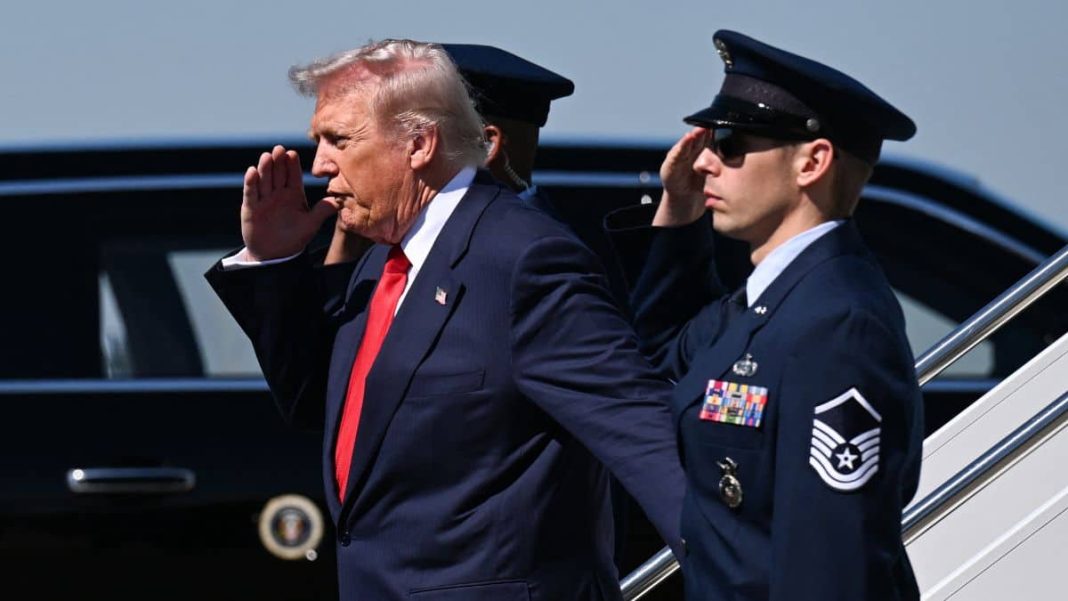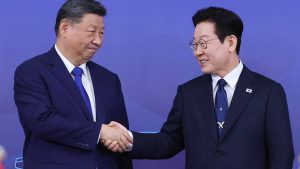Trump’s Nuclear Testing Remarks Spark Global Alarm
President Donald Trump’s announcement about resuming nuclear weapons testing has created international concern and confusion. His statement that the US will “start testing nuclear weapons on an equal basis” with Russia and China threatens to unravel decades of arms control agreements and could mark the first American nuclear tests since 1992.
Key Takeaways
- Trump announced nuclear testing “on equal basis” with Russia and China
- First US nuclear tests since 1992 if implemented
- Experts believe he likely meant missile tests, not explosive detonations
- Global leaders condemn the move as dangerous escalation
Ambiguous Statement Creates Confusion
When asked aboard Air Force One if he meant live nuclear explosions, Trump declined to clarify: “You’ll find out very soon, but we’re going to do some testing, yeah. Other countries do it. If they’re going to do it, we’re going to do it.”
The timing appeared deliberate – Russia had just tested nuclear-capable systems while Trump was en route to meet Chinese leader Xi Jinping.
Testing What Exactly?
Tomáš Nagy, Senior Research Fellow for Nuclear, Space, and Missile Defence, suggests the confusion stems from nuclear terminology. “Testing could therefore refer not to a nuclear explosive test, but to missile systems such as additional Minuteman or Trident trials. All of these would carry symbolic, not explosive, significance.”
If Trump meant missile testing rather than warhead detonation, the declaration would be largely symbolic rather than substantive.
Breaking Global Norms
The United States hasn’t conducted explosive nuclear tests since 1992, relying instead on advanced computer modeling and simulations. Resuming live testing would violate the Comprehensive Nuclear-Test-Ban Treaty (CTBT) and undermine global non-proliferation efforts.
The announcement sparked domestic debate, with Defense Secretary Pete Hegseth calling it “responsible” while critics warned it normalizes dangerous nuclear rhetoric.
International Backlash
Global reactions were swift and critical:
- Russia denied its recent drills were nuclear tests
- China urged US to abide by testing ban
- Japan’s atomic-bomb survivors called the move “utterly unacceptable”
- UN Secretary-General said nuclear testing “can never be permitted”
- Iran accused Washington of hypocrisy
Risk of Escalation
Nagy warns that even talk of testing can trigger dangerous consequences: “A resumption of nuclear testing would risk triggering a destabilising chain reaction. Moscow and Beijing could use it as justification for their own demonstrative tests, and North Korea might follow suit.”
The danger extends beyond actual testing to the normalization of nuclear discourse, what Nagy calls “casualisation of nuclear discourse.”
Strategic Miscommunication Risk
While nuclear deterrence has always involved some ambiguity, Trump’s confusion between warheads and missiles raises deeper concerns. As one former Pentagon official noted: “Deterrence can tolerate ambiguity, but it cannot survive incoherence. When the world’s most heavily armed nuclear power sends mixed signals, others will prepare for the worst.”
For now, Trump’s nuclear remarks appear more rhetorical than operational, but in an era of great-power rivalries and collapsing arms treaties, even careless presidential words can trigger global alarm.






